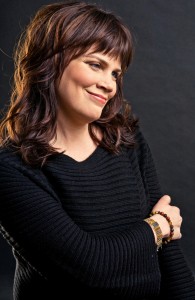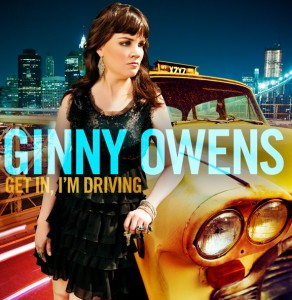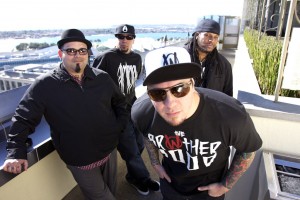Click “Like” to share this with your friends!
When Ginny Owens won the 1999 Lilith Fair talent search, no one (not even Owens) could have guessed that it would launch a decade-plus music career. And while early on she was often noted for her blindness, the gifted singer-songwriter has long since left that footnote in the dust and become more known for her soulful voice and cleverly-crafted lyrics.
Whole Notes recently caught up with the three-time Dove Award winner to talk about the secret behind her longevity, her unique musical influences and her brand new album Get In, I’m Driving:
Chad Bonham: Being in the music business for over 12 years is no small feat. What’s kept you motivated to stick with it despite the up-and-down nature of your career path?
 Ginny Owens: This probably sounds like a cheesy, cliché answer, but God just always seems to send something or someone to kick me in the tail when I don’t want to keep going. And there are a lot of those days. It’s not the art part of it that’s stressful. It can be at times. I think writer’s block, by and large, comes from having to deal with all of the other things in life. When you’re actually in the music business, it comes largely comes from the stress you deal with in being faced with all kinds of business decisions that you kind of wish somebody else would deal with. So there have been lots of times that I’ve just thought, “I do not know if I can keep going.” Part of it is that I’m stubborn and I don’t want to do anything half way. But God really does seem to send people or send events that will inspire creativity and give me a little bit longer to hold on. When I think of it in terms of doing it for 12 years, that’s overwhelming. If I thought I had to do another 12 years of what I’ve experienced, I don’t know if I would be up for it. I think more short term. I try to enjoy the moment, enjoy the process, whatever that is—whether that’s the recording process or being on tour—and just move from one of those seasons to the next rather than thinking about what I want to be doing in 10 years. It’s probably wiser to think that way. I can’t do it. It’s too overwhelming.
Ginny Owens: This probably sounds like a cheesy, cliché answer, but God just always seems to send something or someone to kick me in the tail when I don’t want to keep going. And there are a lot of those days. It’s not the art part of it that’s stressful. It can be at times. I think writer’s block, by and large, comes from having to deal with all of the other things in life. When you’re actually in the music business, it comes largely comes from the stress you deal with in being faced with all kinds of business decisions that you kind of wish somebody else would deal with. So there have been lots of times that I’ve just thought, “I do not know if I can keep going.” Part of it is that I’m stubborn and I don’t want to do anything half way. But God really does seem to send people or send events that will inspire creativity and give me a little bit longer to hold on. When I think of it in terms of doing it for 12 years, that’s overwhelming. If I thought I had to do another 12 years of what I’ve experienced, I don’t know if I would be up for it. I think more short term. I try to enjoy the moment, enjoy the process, whatever that is—whether that’s the recording process or being on tour—and just move from one of those seasons to the next rather than thinking about what I want to be doing in 10 years. It’s probably wiser to think that way. I can’t do it. It’s too overwhelming.
Bonham: I’m always curious about how artists develop their musical sensibilities. What in your life allowed you to have this strong inclination towards RNB rhythms and soulful melodies? Was it growing up in Jackson, Mississippi?
Owens: Growing up in Jackson, the schools that I went to were probably 80 percent African-American. I didn’t know many white people except maybe at church. I was very involved in school. I was a cheerleader. I was on student council. I was very present. So that meant I was immersed in a world of influences that were a little bit unique for a white girl from a very conservative family. My mom certainly didn’t listen to the stuff that I listened to. It took root early on. I had a country phase when I was about 12 that lasted about six months. I had a few pop phases. Probably even now, there’s a lot of pop music that I love even though it’s a little more like junk food. You can only have so much of it and then you’ve got to go on a diet. I grew up really immersed in black music and black culture to the point where when I came to college, it was really a shock. It was such a different environment. Whether it was gospel music or RNB and older stuff like Motown and the Stevie Wonder era, it was what everyone else listened to and so I grew to love it very quickly. I may have anyway. It’s hard to know. It was a very obvious force and influence in my life just because there were other people around me that loved it.
Bonham: When you hit the scene back around 1999, there weren’t many female artists with that soulful singer/songwriter vibe. Then not long after, there was the arrival of Norah Jones and now you’ve got someone like Adele who is hugely successful. It seems like you were somewhat ahead of the curve in that respect.
Owens: Well thank you! You’re my new best friend. I don’t know if I’ve ever thought of myself of being ahead of the curve necessarily, but I can say from a frustration standpoint that every time I wanted to do something—especially the things that were more soulful—I would get in trouble for being left of center. People would say, “Well, you know you’re a little bit of a rebel.” I’m really not. I just love what I love. I remember, for instance, when Norah Jones came out, it was suddenly cool to be a singer/songwriter girl that played jazz chords. I’m a huge Norah Jones fan. You can compare me to her all you want. But it was just frustrating to live in a world where—and maybe it was a Christian music thing—that it wasn’t looked upon favorably until Norah Jones came out and then it was acceptable. And it was at the same with Adele. I was super excited when she her music came out. I remember going to an Adele concert in Nashville. It was a venue where everybody stands up and it was packed with college girls just screaming. Everybody said she had on her grandma sweater and she gets up there and she plays bass for some songs and then just her and the guitar and of course she had the band, but she’s able to capture and conquer this room of a thousand people and hold their attention by doing something that everybody’s always told me you couldn’t do. You can’t be simple. You can’t be comfortable. You can’t go out with just your instrument and wow a crowd. In that sense, I’m just glad people have come along and been able to do those things because it gives me hope that I can continue to have a career doing what I love because other people are doing it. Whether I was ahead or not, I’m just glad it’s still there and people are still managing to do it and do it successfully.
Bonham: Is there an overall theme to the new record and how much of it was influenced by your unique experiences from the past five years?
 Owens: Lyrically, living in New York and going through some different things and watching my mom go through her battle with cancer, I want the songs to point to the idea that there really is something bigger and there really is hope for all us when we’re searching, when we don’t think we’re searching. That was something that was important for me to communicate in every way possible. Musically, it’s my first opportunity to just dive in and throw caution to the wind—which I don’t do well—and not take myself so seriously and do the kind of music that I love. With some of the songs, even songs like “Better That Way” that are much more tongue-in-cheek, there’s a lot more of me just saying it’s time to have fun and love music and embrace it and not take everything so seriously. Of course making this record meant I had to take it very seriously and I worked very hard. But from an artistic standpoint, it was just a fun experience. I wanted to run after everything I loved and see if I could make a record out of it. That was the way that I approached it.
Owens: Lyrically, living in New York and going through some different things and watching my mom go through her battle with cancer, I want the songs to point to the idea that there really is something bigger and there really is hope for all us when we’re searching, when we don’t think we’re searching. That was something that was important for me to communicate in every way possible. Musically, it’s my first opportunity to just dive in and throw caution to the wind—which I don’t do well—and not take myself so seriously and do the kind of music that I love. With some of the songs, even songs like “Better That Way” that are much more tongue-in-cheek, there’s a lot more of me just saying it’s time to have fun and love music and embrace it and not take everything so seriously. Of course making this record meant I had to take it very seriously and I worked very hard. But from an artistic standpoint, it was just a fun experience. I wanted to run after everything I loved and see if I could make a record out of it. That was the way that I approached it.
Bonham: When you really listen to the lyrics, Stevie Wonder’s “Higher Ground” classic song actually has somewhat of a heavy message. I thought your somber interpretation was one of the more compelling tracks on the album.
Owens: Well thanks. And I agree. I think it’s a heavy message and I think it’s also a message that can be interpreted all kinds of ways. When I spent time home with mom, one of the things I would do for relaxation at night was just to sit and just listen to tracks. I remember listening to the lyrics of that song. It’s not like I haven’t heard “Higher Ground” a million times in my life, but the lyrics struck me for the somberness of it, and I thought it could be a fun song to remake. I don’t know why I thought I could get away with that, but at any rate, it was fun to try. I’m still holding my breath. I hope I don’t get chastised too terribly for it.
Bonham: I have to ask about “Better Off.” Was that song based on personal experience?
Owens: Oh man. Unfortunately the story is probably a little less romantic than the song. I had written some of the lines and sat down with my producer and was rewriting to the melody he’d come up with. Really, it was about a couple of relationships. I think a lot of us are this way, but I’m one of those people that just keep coming back for more instead of saying, “I’m better, I’m stronger without this.” Whether it’s a relationship with the opposite sex or whether it’s a friendship, we always have a hard time letting go. We always have a hard time going, “You know, you bring me down. You say dark things. You make life not good.” We always think that we can fix that or do something about it—at least I always think that. If I just behave a certain way, this behavior from the other person will go away. The song is really about that. Some people have said, “Gosh, it’s so mean!” It’s not supposed to be mean. It’s supposed to be freeing. Sometimes we just need to walk away.
Bonham: So at this point in your career, do you feel like you understand your purpose in life?
Owens: All I really know is that I’m called to hopefully inspire others to discover who God is and what the cross means. A lot of times that more off stage than onstage. But as far as my music is concerned, I don’t know. I feel like I write with that in mind but as far as what I’m specifically called to do, I’m just called to speak to the underdog—the little girl that doesn’t feel like she has a purpose—or the cancer survivor or the disabled person that’s gone through lots of challenges. That often tends to be a lot of my audience. Obviously we’ve all gone through challenges, so we all know what that’s like. But I hope that ultimately my calling is to bring hope to those folks, whether it’s in what I say or what I write. As far as music goes, I just hope I get to keep doing it.
To keep up with the latest Ginny Owens news, visit her official website by clicking HERE.

